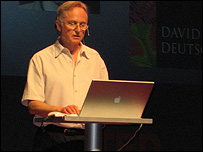Experts in technology, design and entertainment gathered in Oxford to exchange views on the future of the human race.
Avi Blizovsky

The famous scientist and author of many books, Prof. Richard Doknis, opened last week a conference of great thinkers, who warned that our universe is too strange to grasp and understand.
Prof. Dawkins from the University of Oxford, author of the book "The Selfish Garden", said that we live in an intermediate reality that we have created.
Experts in technology, design and entertainment gathered in Oxford to exchange views on the future of the human race. This is the first time that this event, TED GLOBAL is held in Europe.
Prof. Dawkins' opening speech, as part of a discussion called the power of memes, revealed the way in which humans invent their realities in order to make sense of the infinite complexity of the world. Worlds become more complex when you understand the meaning of quantum physics that is beyond human comprehension.
"Are there facts about the universe that will forever be beyond our grasp, in principle, not grasped by any mind, no matter how developed it is? Ask?
Successive generations have come to use terms that are becoming more and more difficult to understand our universe." Each species, in fact, experiences a different "reality". They work using different "software", so that they feel comfortable", he suggests.
Since different camps live according to different models of the world, there is an infinite variety of real worlds. said.
The intermediate world is a narrow range of realities, which we judge as normal in contrast to the strangeness where we judge the very small or the very large. He ponders the possibility of giving children computer games that will allow them to get to know the concept of quantum physics. "It will be an interesting experiment." said.
ET worlds
Our brains have evolved to help us survive within the scales and orders of magnitude in which we exist, Prof Dawkins said. We think that rocks and crystals are solids when in fact they are mostly made of spaces between the atoms. said.
According to him, this is the way the mind thinks about things to help us navigate our "intermediate world", the medium scale world, a world where we cannot see individual atoms. Because we exist in a limited sector of space, and given its vast scale, we cannot expect to be the only creatures in the universe, Prof Dawkins believes. He concluded his talk with the thought that if we could re-engineer his brain, he would rather be a math genius. He would also like time travel to be possible to return to a time when dinosaurs roamed the earth.
A serious issue discussed at the conference was the different perception of reality between Western cultures and developing countries. The businesswoman and economist specializing in developing countries, Jacqueline Novogratz, said that we need to identify with the developing world in order to move away from terms like "us" and "them". According to her, it is not enough to make statements about the elimination of poverty, but to build a stable infrastructure on the ground.
"Events like 11/9 or 7/7 (the attacks in London a few days before the conference). We are reminded that we do not live in three different worlds but in one world." said Ashraf Rani, former Afghan finance minister. According to him, globalization is accelerating and there is a need for real private investments and the creation of opportunities for the economy of the developing countries to flourish.
He attacked the West for only being interested in issues affecting these countries, and polluting the Third World to solve environmental problems in these countries. "You solve problems but you are not interested in issues of corruption" he told the members of the TED GLOBAL delegations.
"We need your imagination to find a solution to the problems of what memes should look like. It is the exchange of ideas that results in breakthrough solutions.
Over 300 scientists, musicians, playwrights, as well as technology pioneers and futurists participated in the conference held between July 12 and 15.
